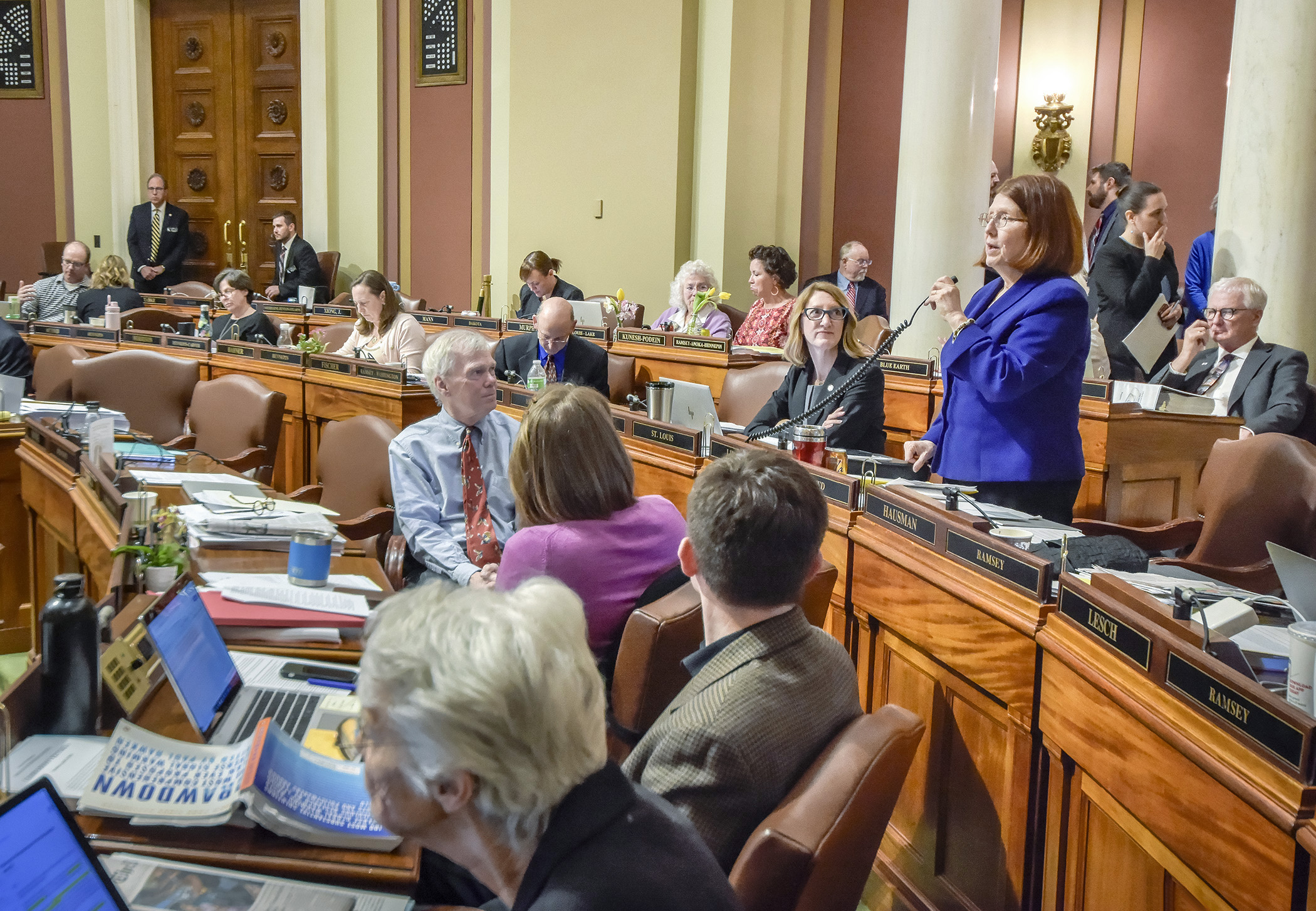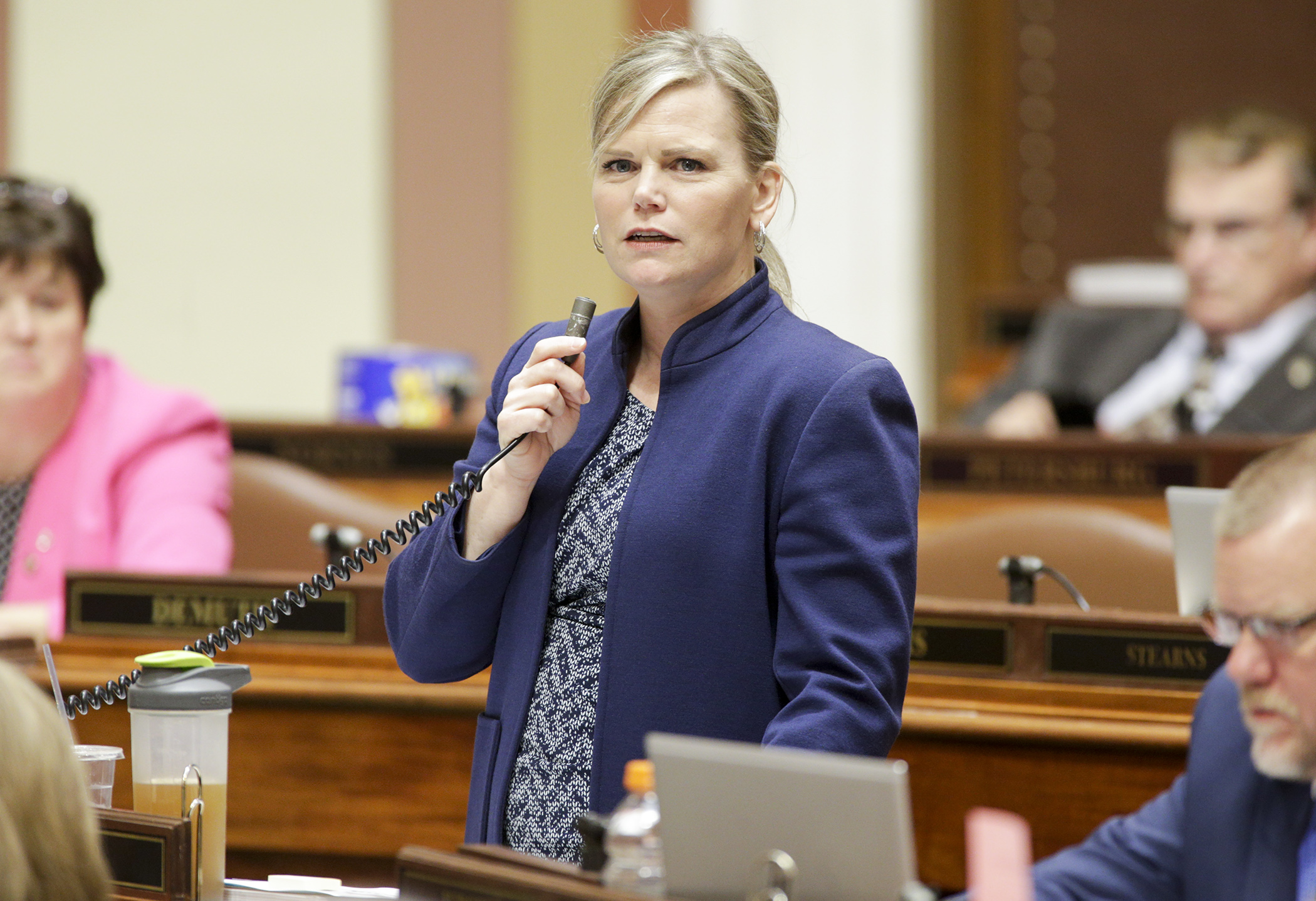After lengthy debate, House passes weighty HHS bill chock full of changes

The House passed the omnibus health and human services finance bill 74-55, as amended, after more than nine hours of exhaustive discussion, impassioned debate, and personal stories lasting into the night Thursday.
HF2414, sponsored by Rep. Tina Liebling (DFL-Rochester), now heads to the Senate, where Sen. Michelle Benson (R-Ham Lake) is the sponsor.
“This bill reduces health care costs, it takes care of our most vulnerable, and it takes a great step toward the future,” Liebling said.
The bill largely draws on the health and human services proposals in Gov. Tim Walz’s budget recommendations and includes the work of the House Early Childhood Finance and Policy Division and the House Long-Term Care Division, whose expansive elder protection proposals includes the licensure of assisted living facilities and accounts for 155 pages of the 1,043-page bill.
The omnibus health and human services finance bill would be primarily funded in the 2020-21 biennium through a $128.64 million increase from the General Fund, totaling about $15 billion in overall spending.
Republicans have criticized both the bill’s length and spending proposals as excessive and said that it could unintentionally result in decreased access and increased costs for individuals.
Among these areas of concern is a provision in the bill that would repeal the sunset of a 2 percent “Provider Tax,” which several Republicans said would amount to a tax increase on the sickest Minnesotans.
 Rep. Anne Neu offers one of a series of amendments to HF2414, the omnibus health and human services finance bill, during floor debate April 25. Photo by Paul Battaglia
Rep. Anne Neu offers one of a series of amendments to HF2414, the omnibus health and human services finance bill, during floor debate April 25. Photo by Paul BattagliaLiebling contends the provision is simply the continuation of a valuable source of revenue that has been in place for at least 25 years. The tax is projected to bring in $970.21 million in revenue over the upcoming biennium and supports the state’s Health Care Access Fund.
“There is no tax being raised, there is just the continuation of something that’s working very well,” she said.
Rep. Anne Neu (R-North Branch) unsuccessfully offered a series of amendments to exempt different medical conditions from the tax – including cancer, diabetes, and pregnancy. Rep. Dave Baker (R-Willmar) offered a similar amendment that would have exempted opioid addiction treatment. It, too, was unsucessful..
Adopted amendments include a provision offered by Rep. Hunter Cantrell (DFL-Savage) that would prohibit conversion therapy for minors and vulnerable adults, though some members expressed concern that it over-reaches in regards to adults.
“I do know there is not a person in this chamber who supports the abuses and atrocities we heard (in committee) … but it does go too far in taking away the right of an individual to determine the outcome they choose,” said Rep. Julie Sandstede (DFL-Hibbing).
Amendments offered by Rep. Tim Miller (R-Prinsburg) and Rep. Peggy Scott (R-Andover) were voted down. They would have limited access to abortions after the detection of a fetal heartbeat and 20 weeks, respectively.
“We know that unborn children can feel pain 20 weeks after fertilization,” Scott said. “We must catch the law up with the reality ... and we need to recognize their humanity.”
Rep. Kelly Morrison (DFL-Deephaven) said this restriction was “particularly cruel,” as it would largely impact women in “very rare, often complex and heartbreaking situations … where something has gone terribly wrong.”
Other notable provisions include:
- $44.81 million to increase MFIP cash grants by $100 a month, the first increase since 1986;
- $21.2 million for an insulin assistance program;
- $8.7 million for ONECare, uniform pharmacy administration and dental reform;
- $7.46 million to fund suicide prevention programming;
- $4.35 million to fund a statewide tobacco cessation quit line;
- $4.16 million to establish and run a Child Welfare Training Academy and conduct a study on child protection worker caseloads;
- $2.5 million to reduce TEFRA parental fees by 15 percent, improving access to supports for children with disabilities;
- $1.48 million to support medical cannabis regulation, and an additional $241,000 to support program modifications;
- $1 million in grants to foster culturally competent mental health care practices;
- $1 million in HIV prevention grants; and
- $40,000 to increase the tobacco sales age to 21.
Measures intended to rein in the cost of health care include a 20 percent premium discount for people who purchase their health insurance through the individual market; a requirement for pharmacy benefit managers to obtain licensure to operate within the state; and an attempt to curb prescription drug costs by leveraging the collective buying power of Minnesota’s public programs through a new ONECare benefit, which would eventually open to the state’s wider population, Liebling said.
The bill also contains language from HF400, the House’s response to the state’s opioid crisis, which is travelling separately through the Legislature, as well, and is currently in conference committee.
Contentious Child Care Assistance Program
Many of the early childhood investments and provisions pertain to the state’s hotly-debated Child Care Assistance Program.
Administered at a local level by counties — and supervised by the Department of Human Services — the program has received ongoing criticism for issues ranging from fraud and mismanagement, to inadequate funding and federal noncompliance.
Intending to address these issues, Rep. Dave Pinto (DFL-St. Paul) explained the bill includes provisions that would increase funding to improve access for low-income families, while also reestablishing integrity and bringing it into federal compliance.
“We are investing a lot in identifying, investigating, going after misuse of funds,” he said. “We are going after it hard.”
The program would receive the following 2020-21 appropriations:
- $25.72 million to eliminate the basic sliding fee wait list;
- $10.84 million to update the maximum rates;
- $8.2 million for federal compliance and program improvements; and
- $2.09 million to strengthen oversight, plus an additional $153,000 in supplemental funds for provider registration and oversight.
Advocates say child care assistance is an important tool in helping low-income working families afford child care and, in turn, improve their economic outlook, and that current funding isn’t enough to meet the need.
“The problem is we have children who are on a waiting list, and families who are waiting to receive the child care assistance they need to be able to enter the work force to not be dependent on public programs,” Pinto said.
Republicans strongly opposed any new investments in the programs, and unsuccessfully proposed several amendments that would reroute the new funds, restructure the program’s oversight, and modify requirements for providers who receive child care assistance.
Rep. Mary Franson (R-Alexandria) successfully offered an amendment that would require all program licensors to immediately report any suspected fraud to the appropriate authorities.
“I think it is very wise of us to say to the taxpayers that we are taking this issue very seriously because taxpayers know that we here have problem with fraud,” she said, “there is rampant fraud that is continuing in this program.”
— Session Daily Writer Rachel Kats contributed to this story.
Related Articles
Search Session Daily
Advanced Search OptionsPriority Dailies
Ways and Means Committee OKs proposed $512 million supplemental budget on party-line vote
By Mike Cook Meeting more needs or fiscal irresponsibility is one way to sum up the differences among the two parties on a supplemental spending package a year after a $72 billion state budg...
Meeting more needs or fiscal irresponsibility is one way to sum up the differences among the two parties on a supplemental spending package a year after a $72 billion state budg...
Minnesota’s projected budget surplus balloons to $3.7 billion, but fiscal pressure still looms
By Rob Hubbard Just as Minnesota has experienced a warmer winter than usual, so has the state’s budget outlook warmed over the past few months.
On Thursday, Minnesota Management and Budget...
Just as Minnesota has experienced a warmer winter than usual, so has the state’s budget outlook warmed over the past few months.
On Thursday, Minnesota Management and Budget...